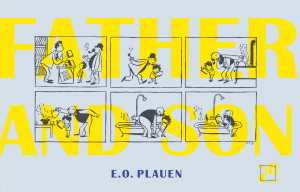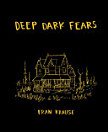Father and Son
2017. g. maijs · New York Review of Books
5,0star
1 atsauksmereport
E-grāmata
312
Lappuses
family_home
Piemērota
info
reportAtsauksmes un vērtējumi nav pārbaudīti. Uzzināt vairāk
Par šo e-grāmatu
Father and Son is one of the most beloved comic strips ever drawn—an uproarious, timeless ode to the pleasures, pitfalls, and endless absurdity of family life.
Father and Son is a slyly heartwarming, dizzyingly inventive classic in the tradition of Calvin and Hobbes and The Simpsons. Created in 1934 by the German political cartoonist Erich Ohser (using the pseudonym E.O. Plauen after being blacklisted for his opposition to the Nazi regime), the gruff, loving, mustachioed father and his sweet but troublemaking son embark on adventures both everyday and extraordinary: family photoshoots and summer vacations, shipwrecks and battles with gangsters, a Christmas feast with forest animals and a trip to the zoo. Drawn almost entirely without dialogue, the strips overflow with slapstick, fantasy, and anarchic visual puns. Father and Son remains an uproarious, timeless ode to the pleasures, pitfalls, and endless absurdity of family life.
This NYRC edition is an extra-wide hardcover with raised cover image, and features new English hand-lettering.
Father and Son is a slyly heartwarming, dizzyingly inventive classic in the tradition of Calvin and Hobbes and The Simpsons. Created in 1934 by the German political cartoonist Erich Ohser (using the pseudonym E.O. Plauen after being blacklisted for his opposition to the Nazi regime), the gruff, loving, mustachioed father and his sweet but troublemaking son embark on adventures both everyday and extraordinary: family photoshoots and summer vacations, shipwrecks and battles with gangsters, a Christmas feast with forest animals and a trip to the zoo. Drawn almost entirely without dialogue, the strips overflow with slapstick, fantasy, and anarchic visual puns. Father and Son remains an uproarious, timeless ode to the pleasures, pitfalls, and endless absurdity of family life.
This NYRC edition is an extra-wide hardcover with raised cover image, and features new English hand-lettering.
Vērtējumi un atsauksmes
5,0
1 atsauksme
Par autoru
E.O. Plauen was the pseudonym of Erich Ohser (1903–1944). In the 1920s, he studied art in Leipzig and began a career as a cartoonist and illustrator. He moved to Berlin in 1927, and began collaborating with his friend, the writer Erich Kästner, including drawing illustrations for Kästner’s first book of poetry (which would later be burned by the Nazis). Ohser’s caricatures of high-ranking Nazis such as Goebbels and Hitler led to his being banned from publishing after they took power. Unable to use his own name, he paired his initials, “E.O.,” with “Plauen,” the town he grew up in, and using this pseudonym created Vater und Sohn in 1934; it appeared in the Berliner Illustrirte Zeitung, to great acclaim, until 1937. Though he was allowed to return to regular magazine work in 1940—his caricatures of Stalin were especially popular—he was arrested four years later by the Gestapo for disparaging the regime. The day before his trial, he committed suicide in his cell.
Joel Rotenberg was trained as a linguist and now translates from German and French. He lives in New York.
Joel Rotenberg was trained as a linguist and now translates from German and French. He lives in New York.
Novērtējiet šo e-grāmatu
Izsakiet savu viedokli!
Informācija lasīšanai
Viedtālruņi un planšetdatori
Instalējiet lietotni Google Play grāmatas Android ierīcēm un iPad planšetdatoriem/iPhone tālruņiem. Lietotne tiks automātiski sinhronizēta ar jūsu kontu un ļaus lasīt saturu tiešsaistē vai bezsaistē neatkarīgi no jūsu atrašanās vietas.
Klēpjdatori un galddatori
Varat klausīties pakalpojumā Google Play iegādātās audiogrāmatas, izmantojot datora tīmekļa pārlūkprogrammu.
E-lasītāji un citas ierīces
Lai lasītu grāmatas tādās elektroniskās tintes ierīcēs kā Kobo e-lasītāji, nepieciešams lejupielādēt failu un pārsūtīt to uz savu ierīci. Izpildiet palīdzības centrā sniegtos detalizētos norādījumus, lai pārsūtītu failus uz atbalstītiem e-lasītājiem.




